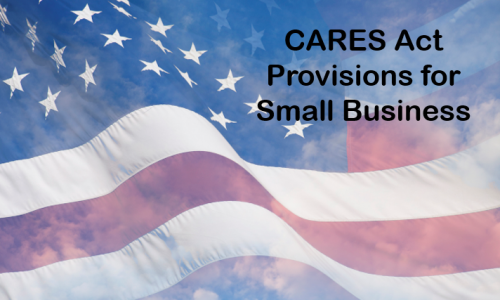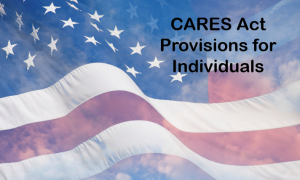
CARES Act – Benefits for Individuals
The CARES Act offers relief to many Americans impacted by the Coronavirus pandemic
The Coronavirus Aid, Relief, and Economic Security (CARES) Act is a $2 trillion economic relief plan, which includes direct payments to many Americans, expanded unemployment benefits, and additional benefits for individuals and families during these difficult times.
Recovery Rebates for Individuals

CARES provides direct rebates of up to $1,200 for each qualified adult ($2,400 for married couples) and $500 per child. The full rebate amount is available if you have income at or below $75,000 ($150,000 for married couples), phases out as income increases and is capped with income above $99,000 ($198,000 for married couples).
Update: Economic impact payments: What you need to know
Pandemic Unemployment Insurance
CARES expands existing state-level unemployment insurance benefits for individuals effected by the Coronavirus-related economic downturn. It adds $600 per week to existing state-level benefits through the end of July. For those in need, CARES provides an extra 13 weeks of benefits beyond what states usually permit. Pandemic Unemployment Assistance will even cover many who were typically excluded from a state’s program like independent contractors, free lancers, self-employed individuals, and “gig” workers (i.e. Lyft or Uber drivers). It will not be available to those who are compensated for working remotely or are receiving paid leave.
Retirement Plans
CARES waives the normally imposed 10 percent penalty for premature withdrawals from retirement accounts up to $100,000 and permits 3 years for repayment. If not repaid, income is spread over 3 years. The limit of $50,000 for loans from qualified loans is increased to $100,000.
Required Minimum Distributions
Required Minimum Distributions are suspended for 2020.
Student Loans
CARES defers payments on federal student loans through September 30, 2020. Employer payments on employee student loans is a tax-free fringe benefit for 2020 (not to exceed $5,250 decreased by other educational assistance programs).
Increased Incentives for Charitable Contributions
The CARES Act attempts to get funds to charitable organizations quickly by allowing both individuals and businesses to claim increased deductions for all cash contributions. Since so many people now taking the standard deduction, the Act permits an “above the line” deduction of up to $300 during 2020. Limitations for 2020 are relaxed so that individuals can take an itemized deduction for cash contributions of up to 100 percent of their gross income.
We continue to update our Coronavirus Resources Page. KRS professionals are available and working remotely. Please contact us if you have any questions, concerns, or need advisement during this unprecedented time.




